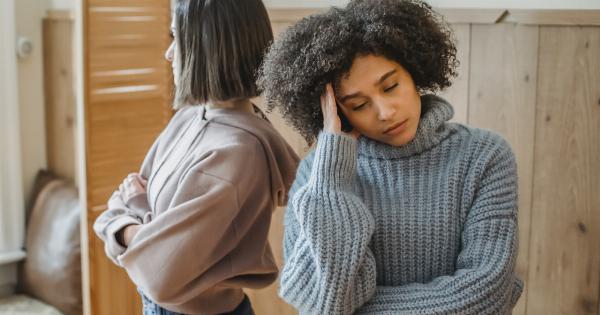Anxiety is a common condition that affects millions of people around the world. It is characterized by feelings of fear, worry, and apprehension, and it can manifest in several different ways.
In this article, we will discuss the physical and emotional symptoms of anxiety, as well as some of the common triggers and treatment options.
Physical Symptoms
One of the most common manifestations of anxiety is physical symptoms. These may include:.
1. Rapid Heartbeat
When you are anxious, your heart may start to race or beat irregularly. This can be very distressing and may make you feel like you are having a heart attack.
2. Sweating and Trembling
Many people who are anxious experience sweating and trembling, especially in their hands and feet. This can be embarrassing and may make it difficult to perform everyday tasks.
3. Shortness of Breath
If you are feeling anxious, you may also experience difficulty breathing or shortness of breath. This can be very frightening and may lead to panic attacks.
4. Stomach Problems
Anxiety can also cause stomach problems such as nausea, diarrhea, and stomach cramps. These can be very uncomfortable and may exacerbate feelings of anxiety.
5. Headaches
Headaches are another common symptom of anxiety. They may be mild or severe and can make it difficult to concentrate or perform everyday activities.
Emotional Symptoms
In addition to physical symptoms, anxiety can also manifest itself emotionally. Some common emotional symptoms include:.
1. Feelings of Dread or Panic
If you are anxious, you may experience feelings of dread or panic. These can be very intense and may make it difficult to perform everyday activities.
2. Irritability and Restlessness
Many people who are anxious also experience irritability and restlessness. They may find it difficult to sit still or concentrate on tasks.
3. Difficulty Sleeping
Anxiety can also make it difficult to sleep. You may have trouble falling asleep or staying asleep, and may wake up frequently during the night.
4. Avoidance Behaviors
Some people who are anxious may avoid certain situations or activities that they perceive as being stressful. This can be very limiting and can prevent them from enjoying life to the fullest.
5. Negative Thoughts
Finally, anxiety can also lead to negative thoughts and feelings. You may worry excessively about things that are unlikely to happen or have a negative outlook on life in general.
Triggers
There are many different things that can trigger anxiety. These may include:.
1. Stressful Life Events
Major life events such as the loss of a loved one, divorce, or financial problems can all trigger anxiety.
2. Health Problems
Health problems such as chronic pain, obesity, or a serious illness can all cause anxiety.
3. Substance Abuse
Drugs and alcohol can also trigger anxiety. In fact, many people who suffer from anxiety also have a substance abuse problem.
4. Genetics
Finally, genetics may also play a role in the development of anxiety. If you have a family history of anxiety or other mental health disorders, you may be more likely to develop the condition yourself.
Treatments
If you are suffering from anxiety, there are several different treatment options available. These may include:.
1. Therapy
Therapy can be very helpful in treating anxiety. Cognitive-behavioral therapy (CBT) is a common type of therapy that can help you identify and change negative thought patterns.
2. Medication
If your anxiety is severe, medication may be necessary. Anti-anxiety medications such as benzodiazepines or antidepressants can be very effective in reducing symptoms.
3. Lifestyle Changes
Lifestyle changes such as exercise, healthy eating, and getting enough sleep can also help to reduce anxiety. Avoiding stimulants such as caffeine and nicotine may also be helpful.
4. Alternative Therapies
Finally, there are several alternative therapies that may be helpful in treating anxiety. These may include acupuncture, massage therapy, or mindfulness meditation.




























